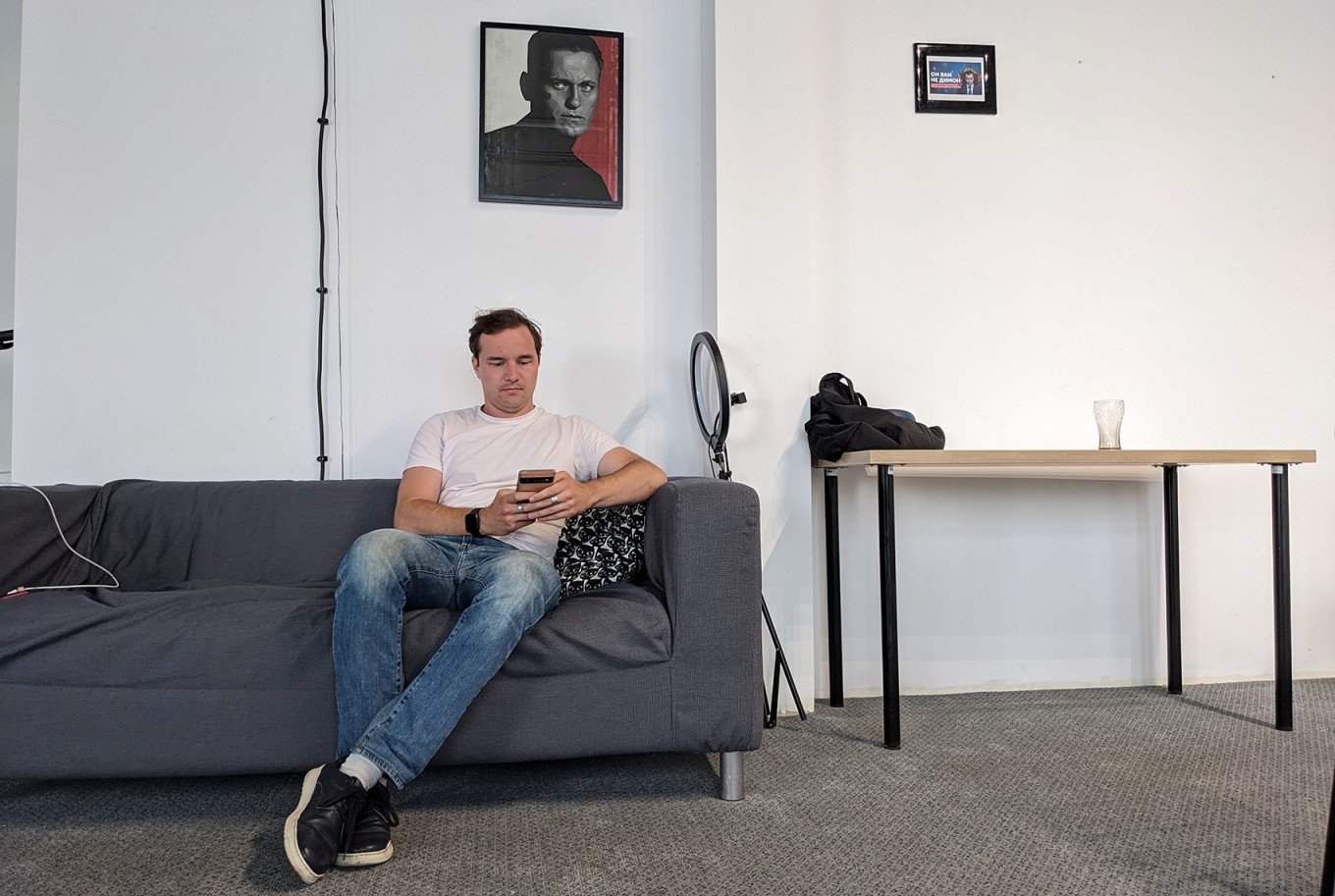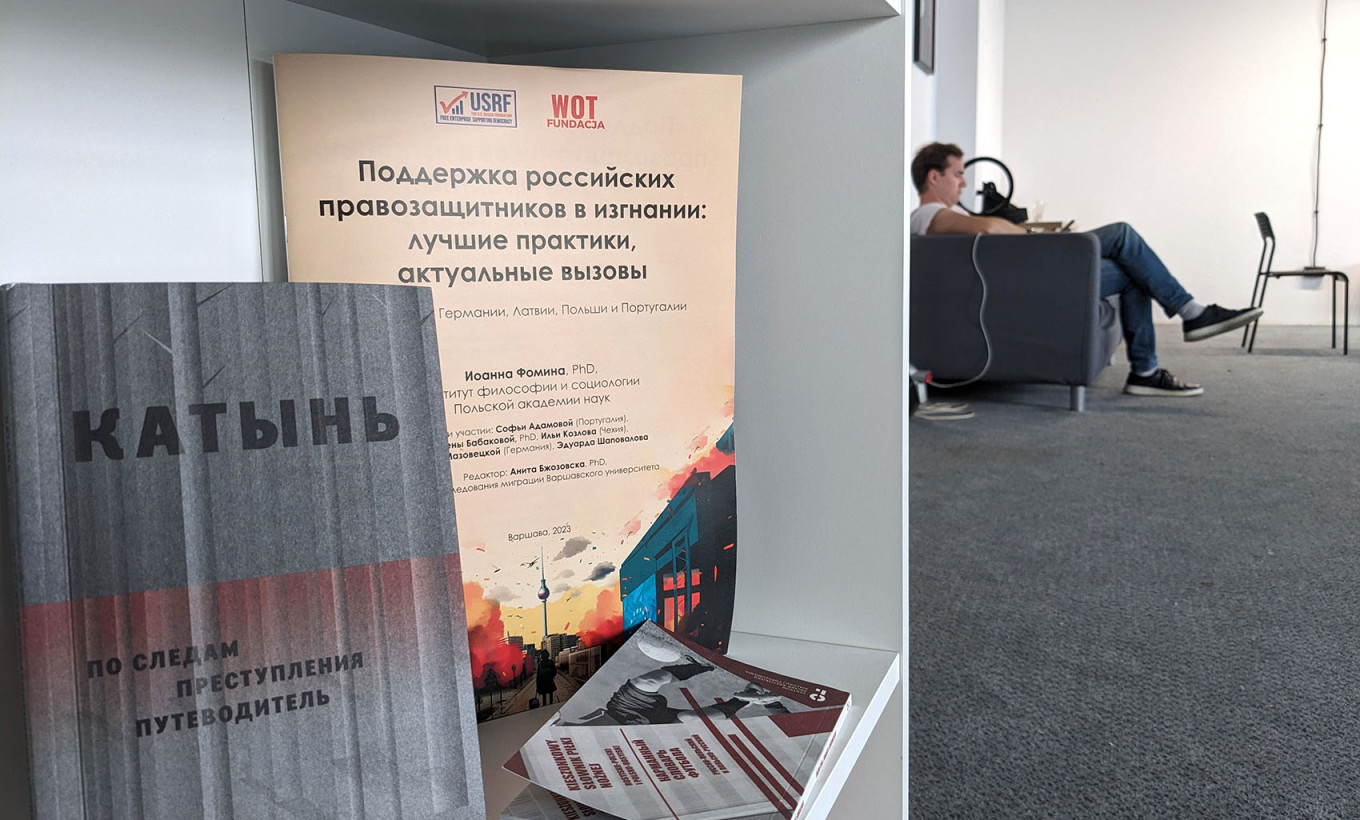WARSAW, Poland — “Poland has never been a popular immigration destination for Russians,” says Alexandr Menyukov, a Warsaw-based coordinator of Kovcheg, an international group supporting Russian wartime emigres and activists.
“This is, perhaps, understandable, because in Russian propagandists’ list of enemies Poland ranks second after the U.S. It even seems like Russia is fighting the war not against Ukraine, but against the U.S. and Poland,” he adds.
The Moscow Times met with Menyukov and his colleague Oleg Rodin at Kovcheg’s community space in the Praga Północ neighborhood, which in the 1990s had a reputation as Warsaw’s most dangerous area but is now one of its fastest-gentrifying districts.
A hub for the city’s small community of young Russian exiles to participate in Polish-language-learning groups and political roundtables, Kovcheg’s space, seems like a seamless fit for Praga Północ where new hipster bars, cafes, craft studios and community spaces seemingly pop up every day.
“I haven’t experienced any Russophobia here, to be honest,” says Rodin, the former head of Nizhny Novgorod office of the opposition Yabloko party who fled Russia at the outset of the invasion of Ukraine when his collection of signatures for an anti-war petition nearly landed him in prison.
“I went on a date with a Ukrainian woman from Bucha here once and all throughout it I heard that the only good Russians are dead Russians,” Rodin recalled, dubbing the encounter “understandable,” but “still unpleasant.”

“I haven’t had any situations like that since then. I interacted with other Ukrainians who spoke Ukrainian, while I spoke Russian…and everything was fine between us in that regard,” Rodin added. “As for the Poles…Well, I haven’t experienced any discrimination from them either.”
The Russian emigre community in Poland — one of the most populous EU member states with over 36 million residents — makes up a tiny share of the population, with its numbers at around 30,000 people, according to Kovcheg.
In comparison, some 310,000 Belarusian citizens reside in Poland along with 960,000 Ukrainian citizens who fled here from Russia’s invasion.
Though Russian officials and propagandists tirelessly speak of Poles being “ready to devote their lives to hating Russians,” Poland also was among the first European countries to impose visa issuance and entry restrictions for Russian citizens following the Kremlin’s invasion of Ukraine.

The ban, however, had no influence on Poland’s policy for issuing humanitarian visas to political refugees, which remains one of the most liberal in the EU, putting the country among the top most desirable destinations for people fleeing persecution from authoritarian governments, including Russian nationals who spoke with The Moscow Times.
“We don’t feel Russophobia because we are not Russians,” joked Batlay Matenov, an ethnic Buryat journalist from Russia’s Far East republic of Buryatia who moved to Warsaw nearly two years ago.
He and his wife Liliya Mongush, a native of Russia’s Siberian republic of Tyva, run the award-winning media platform Asians of Russia, a project known for its firm anti-war stance and dedication to shedding light on Indigenous Asian peoples of Russia.
“Poles really helped us when we just arrived,” Mongush explained. “We never felt anything resembling the so-called Russophobia. There were challenges, but mostly because we didn’t have a residency permit.”
Mongush says the family did not experience blatant anti-Asian racism either and even found a supportive Warsaw-based community of Mongolian studies enthusiasts. Among these was their first landlord, a loyal fan of Tyvan folk band Huun-Huur-Tu.

But Mongush and Matenov’s life in Poland hasn’t been without its rocky moments.
“Our son used to go to a Polish primary school and really liked it, but when his Ukrainian classmates found out that he is from Russia, they became afraid of him,” said Mongush, who then transferred her son to study at an online international school.
“But I understand this reaction. I have no judgment. No hard feelings,” she added.
Though humanitarian visas are still possible to obtain, Russian nationals continue to run into problems when trying to prolong their stay in Poland and obtain a residence permit — the subject of an ongoing discussion between Kovcheg and Poland’s Foreign Ministry, according to Rodin.
“We believe that…humanitarian residency permits like those for Belarusians would be necessary [for Russian nationals],” explains Rodin.
Kovcheg’s members say that they were pleasantly surprised to find Polish politicians to be not only willing but proactive in engaging with Russian political exiles.
Attesting to their claims was the May visit of Russian opposition politician Yulia Navalnaya to Poland, where she met with Foreign Minister Radosław Sikorski who, in turn, pledged to provide support to exiled Russian opposition activists and journalists.
“They [Polish officials] are interested in the formation of a politically engaged diaspora,” says Menyukov.
Rodin echoed this sentiment, saying: “There is an opportunity for dialogue and I think the Poles are also interested in it.”
He added: “But I realize that when we fight for the rights of Russians, we must also fight for the rights of other minorities. Because they also face very significant problems here. There is, for example, a lot of prejudice against people from Central Asia.”
A Message from The Moscow Times:
Dear readers,
We are facing unprecedented challenges. Russia’s Prosecutor General’s Office has designated The Moscow Times as an “undesirable” organization, criminalizing our work and putting our staff at risk of prosecution. This follows our earlier unjust labeling as a “foreign agent.”
These actions are direct attempts to silence independent journalism in Russia. The authorities claim our work “discredits the decisions of the Russian leadership.” We see things differently: we strive to provide accurate, unbiased reporting on Russia.
We, the journalists of The Moscow Times, refuse to be silenced. But to continue our work, we need your help.
Your support, no matter how small, makes a world of difference. If you can, please support us monthly starting from just $2. It’s quick to set up, and every contribution makes a significant impact.
By supporting The Moscow Times, you’re defending open, independent journalism in the face of repression. Thank you for standing with us.
Once
Monthly
Annual
Continue

Not ready to support today?
Remind me later.
×
Remind me next month
Thank you! Your reminder is set.